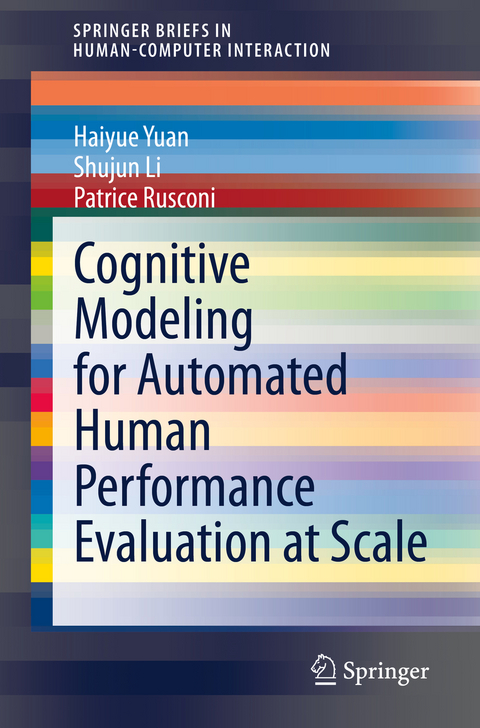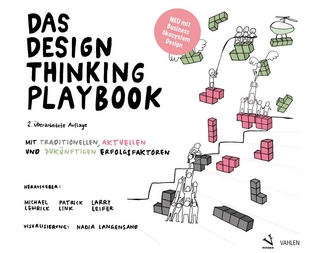
Cognitive Modeling for Automated Human Performance Evaluation at Scale
Springer International Publishing (Verlag)
978-3-030-45703-7 (ISBN)
Cognitive models and software tools have been widely used for both research and commercial purposes. Although they have proved very useful, there are some limitations preventing large-scale modeling and simulation tasks to be carried out efficiently and effectively. In this book, we aim to provide readers with a systematic overview of state-of-the-art cognitive modeling software tools and applications and an introduction to a new software framework for facilitating large-scale modeling and simulation of human-performance tasks.
The authors first review cognitive modeling theories and then present an overview of state-of-the-art software tools for cognitive modeling and simulation. Finally, the book focuses on the new software framework and a research prototype called CogTool+, including how to incorporate behavioral data such as eye-tracking data in modeling and simulation tasks. Typical applications of CogTool+ in HCI and cyber security are given to demonstrate its usefulness.
Dr Patrice Rusconi received his combined BSc and MSc degree and PhD in Psychology at the University of Milano-Bicocca (Italy). He is currently a Lecturer in Psychology at the University of Surrey (UK) and the Programme leader for MSc Social Psychology, Erasmus Departmental Coordinator, and International Officer. He conducted part of his PhD research as a visiting scholar at the University of California, San Diego (US). He earned his PhD in Social, Cognitive and Clinical Psychology in January 2011 with a thesis on the psychological mechanisms involved in information search and evaluation. He continued to work at the University of Milano-Bicocca as a Postdoctoral Research Fellow before joining the University of Surrey as a Lecturer in Psychology in October 2013. In 2019 and 2020, he was Visiting Professor at the Department of Oncology and Hemato-Oncology of the University of Milano (Italy) and at the Department of Psychology of the University of Torino (Italy). As a co-investigator, he was awarded a grant from the EU on medical decision making in Parkinson's Disease and a joint Singapore's National Research Foundation and EPSRC grant on the role of human behavior in cyber security. His main research interests lie in the areas of social cognition, judgment, and thinking and reasoning. His current research projects concern social cognition, judgment and decision making, health psychology, problem solving and computational modeling, and, more recently, space psychology and the psychology of extreme environments. Dr Haiyue Yuan is currently a Postdoctoral Research Fellow at the Centre for Vision, Speech, and Signal Processing (CVSSP), at the University of Surrey. He received his BEng in Mobile Communication Systems and MSc in Finance at the University of Sheffield. He earned his PhD in Electronic Engineering/Human Computer Interaction (HCI) from the CVSSP at the University of Surrey in 2013, where his research focuses on user aspects of stereoscopic 3D video interaction. Then, he continued to work as a Postdoctoral Research Fellow at Department of Computer Science and CVSSP at the same university. He has been working on a number of multidisciplinary projects funded by the Innovate UK and the Engineering and Physical Sciences Research Council (EPSRC), and his work involves developing algorithms to analyse vehicles behavior using Automatic Number Plate Recognition (ANPR) data, developing software tool to facilitate cognitive modeling tasks, developing ecosystem/framework for augmenting next generation paper, and etc. He has published more than 15 conference/journal papers, including one best paper award at 5th International Conference on Human Aspects of Information Security, Privacy, and Trust, affiliated conference of 19th International Conference on Human-Computer Interaction in 2017. His research interests include HCI, 3D video processing/applications, usable security, computational cognitive modeling, augmented reality, and natural language processing/applications.
Introduction.- Cognitive Approaches to Human Computer Interaction.- State of the Art of Cognitive Modeling Software Tools.- Integration of Behavioral Data.- Large-scale Human Performance Modeling Framework.- Example Applications of CogTool+.- Future Research Directions.
| Erscheinungsdatum | 18.09.2020 |
|---|---|
| Reihe/Serie | Human–Computer Interaction Series | SpringerBriefs in Human-Computer Interaction |
| Zusatzinfo | XI, 97 p. 56 illus. |
| Verlagsort | Cham |
| Sprache | englisch |
| Maße | 155 x 235 mm |
| Gewicht | 185 g |
| Themenwelt | Mathematik / Informatik ► Informatik ► Betriebssysteme / Server |
| Informatik ► Software Entwicklung ► User Interfaces (HCI) | |
| Schlagworte | Cognitive Modeling • Cognitive Modeling Software/Tools • cybersecurity • Eye Tracking • Human Computer-Interaction |
| ISBN-10 | 3-030-45703-6 / 3030457036 |
| ISBN-13 | 978-3-030-45703-7 / 9783030457037 |
| Zustand | Neuware |
| Informationen gemäß Produktsicherheitsverordnung (GPSR) | |
| Haben Sie eine Frage zum Produkt? |
aus dem Bereich


